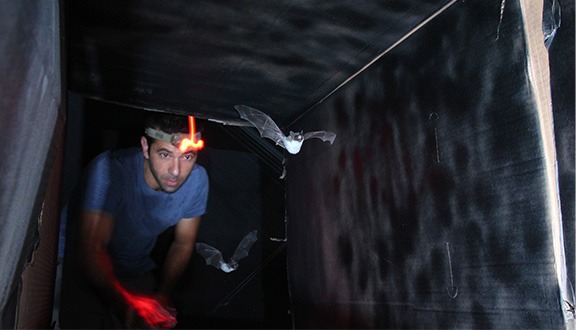A new study from Tel Aviv University disproves the prevailing scientific assumption that bats are immune to age-related hearing loss. This assumption led researchers to mistakenly believe that because hearing is so critical to the bats’ echolocation system, they preserve a good hearing ability, enabling orientation even at an advanced age.
“Turn left at the next tree! Hey, did you catch that??”
In the present study the researchers found that the bats’ sense of hearing does in fact deteriorate with age, but at a relatively slow rate – compared to humans and other mammals. Since they live in very noisy colonies, where more rapid hearing loss might have been expected, the researchers hypothesize that the bats may have developed special adaptations that slow down the process.
The study was led by PhD student Yifat Tarnovsky from the laboratory of neuro-ecologist Prof. Yossi Yovel of the School of Zoology at The George S. Wise Faculty of Life Sciences, Head of TAU’s Sagol School of Neuroscience, in collaboration with Prof. Karen Avraham, Dean of TAU’s Faculty of Medicine, Dr. Shahar Taiber from her lab and Prof. Jerry Wilkinson from the University of Maryland. The paper was published in Life Science Alliance.
Prof. Yovel explains that the ability to discern high frequencies is critical for the survival of bats, which rely on it to orient themselves in their surroundings. However, to date no study has systematically examined the effects of aging on hearing in bats.
The researchers used DNA methylation accumulation to assess the age of 47 wild Egyptian fruit bats (Rousettus aegyptiacus), and then tested their hearing by monitoring auditory brainstem responses to sounds of varying frequency and intensity. The recordings clearly indicated age-related hearing loss, and just like in humans, this deterioration was more marked in the higher frequencies. The rate of deterioration was found to be similar to hearing loss observed in aging humans.

Prof. Yossi Yovel with two winged friends
Additional tests showed that like in humans, hearing loss in bats is related to the structure and function of the cochlea, alongside slower processing by the auditory nerve. Tarnovsky explains: “In humans, this last symptom can affect speech comprehension. In older bats it can be detrimental to echolocation. The Egyptian fruit bats we studied rely on echolocation to perform various tasks, but whenever possible they also rely substantially on eyesight. Therefore, our tests should be replicated in bats with poor eyesight, that rely almost exclusively on echolocation to orient themselves.”
New Discoveries About the Process of Hearing Loss
The researchers assume that one cause of hearing loss in Egyptian fruit bats could be cumulative exposure to high noise levels in their environment. Like many other bat species, Egyptian fruit bats live in large colonies and use loud and frequent social vocalizations to communicate. By placing several microphones inside the fruit bats’ cave, Tarnovsky and her colleagues discovered that the bats are frequently exposed to a sound intensity of over 100 dB, equal to that of a motorcycle or power saw. Surprisingly, the loudest noise was found in low frequencies, while the tests indicated that hearing loss occurs mostly in high frequencies.
“The relatively slow rate of age-related hearing loss (similar to the rate in humans) despite lifelong exposure to very high noise levels may indicate that bats have developed special adaptations for coping with their noisy surroundings,” says Prof. Yovel. The researchers hope that understanding these adaptations can provide new insights about the mechanisms of age-related hearing loss in humans.

